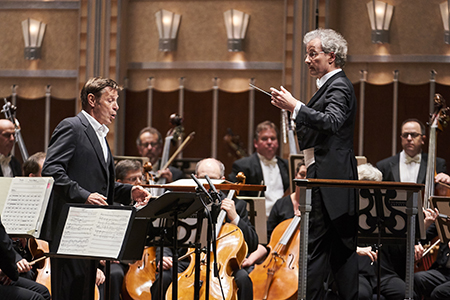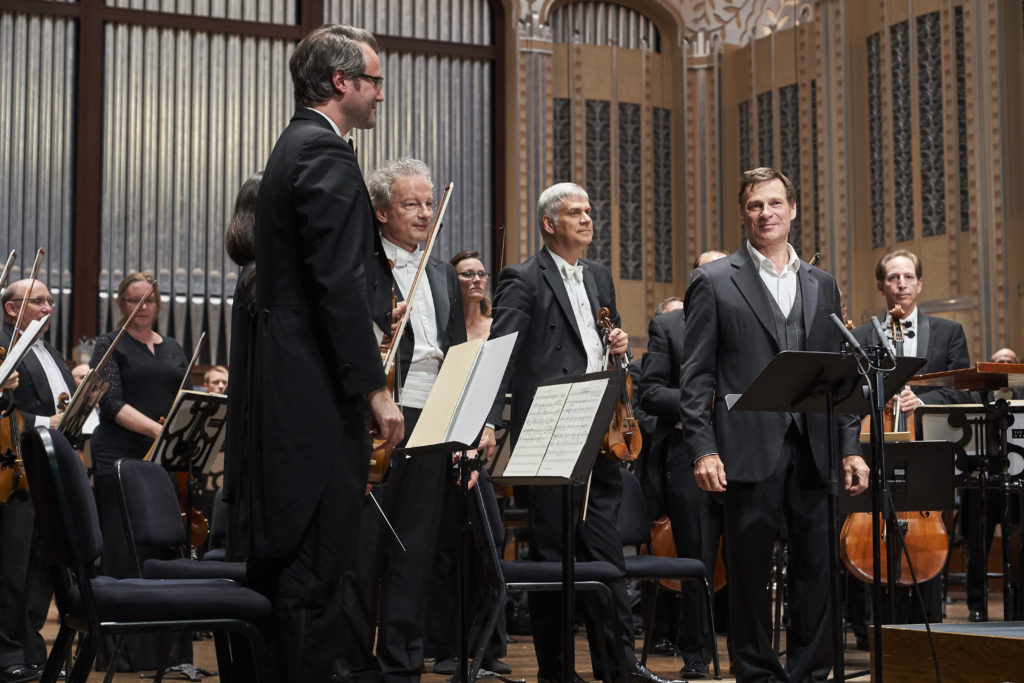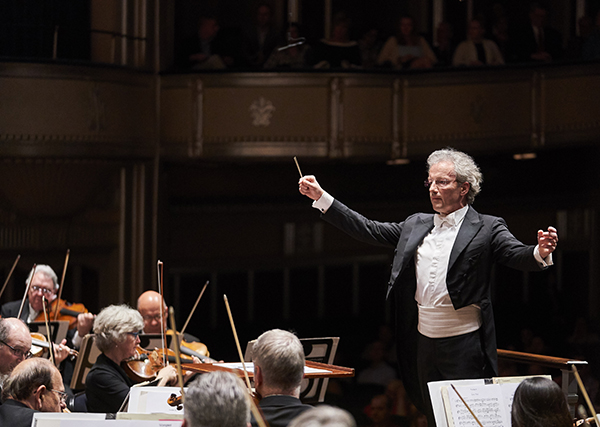by Daniel Hathaway

Schubert was so captivated by Wilhelm Müller’s poems that he set 20 of them in 1823 as Die schöne Müllerin, then in 1827 put 24 more to music in Winterreise. Both cycles explore the raw emotions of unrequited love and its consequences. The journeyman miller of the first cycle becomes despondent enough to drown himself in the brook that has served as his confessor and companion, while the unidentified winter wanderer of the second is slowly driving himself mad.
There are various ways to put Winterreise onstage, ranging from relatively straightforward interpretations to near-psychopathic actings-out. Keenlyside gave us something in between. Taking off his wristwatch — some sort of performance ritual? — he paced and fretted, wrung his hands, mopped his brow, and held the audience in thrall for just over an hour as he virtually trekked through ice and snow, becoming increasingly isolated from the rest of humanity.
In his tortured musings, our wanderer talks to a linden tree, compares his grief to a frozen river with a roaring undercurrent, dreams of a balmy spring, fantasizes about receiving a letter, envisions a carrion crow feasting on his body, lurks in a sleeping village, compares himself to a stormy morning, dreams of a warm, cheerful house that turns out to be a deception, and — seeing a signpost — takes the road less traveled “from which no one ever returns.” Finally (Keenlyside now standing at the front of the stage), he muses on an old hurdy-gurdy player nobody listens to and whose tip-jar is always empty.
Simon Keenlyside alternated robust vocal physicality with anguished yearning throughout the cycle, perfectly matched by Katyukova’s stylish playing of Schubert’s imaginative piano parts. At the end, before acknowledging the enthusiastic ovation, he put his wristwatch back on.
The baritone sang Müller’s German texts with impeccable diction on Sunday. On Thursday evening, Keenlyside enjoyed the sensitive collaboration of Franz Welser-Möst and The Cleveland Orchestra as he added Swedish and Finnish to his command of languages in eight of the some hundred songs that Jean Sibelius had penned during his career.
Seven of the eight were originally conceived for voice and piano and have been arranged for orchestra by various hands, while Sibelius himself adapted the eighth (Kom nu hit, död, originally intended for either piano or guitar) for harp and strings. The poets are mostly obscure except for Shakespeare (the “Come away, death” lyric from Twelfth Night) and Richard Dehmel, whose verses were admired and set by Strauss and Schoenberg.
Singing from a score, Keenlyside made the songs into little Romantic tableaux, matching poetic imagery with a variety of vocal colors. Original texts and translations were printed in the program book, though with the house lights dimmed so low, and two rarely encountered languages to deal with, it was nearly impossible to follow along. But Keenlyside put them across so vividly that basic comprehension of the subjects wasn’t much of a problem.
The audience rewarded the baritone with a huge ovation and several callbacks. After Welser-Möst acknowledged concertmaster Peter Otto for his elaborate solo in Aus banger Brust, Keenlyside tried to coax Welser-Möst back onstage to join him for subsequent bows, but the conductor let the singer bask alone in the applause.
The beginning of Thursday’s program also took place in Nordic lands with three short movements from Grieg’s incidental music to Ibsen’s Peer Gynt, including the prelude to Act IV, the death of Åse, and the wedding scene that precedes Act I. Though some of the faster sections were a bit hectic, the Orchestra played luminously, including two soloists at the wedding: clarinetist Daniel McKelway, and violist Wesley Collins, who made a rare offstage appearance imitating a Hardanger fiddle.
The itinerary headed south after intermission, when the Orchestra closed its 101st season with a curiosity — Richard Strauss’ Aus Italien. The 23-year-old composer’s earliest attempt at a tone poem shows signs of glorious writing to come, but not quite yet. The piece is conceived on a grander scale than its musical content can support. The crowning blow comes at the beginning of the finale, when “Neopolitan Folk Life” is heralded by Funiculì, Funiculà, not a folk tune as the composer thought, but a pop song written in 1886.
Still, The Cleveland Orchestra played gloriously (and heads in the audience bobbed along merrily to that catchy tune in the last movement). Not the most auspicious conclusion to an orchestral season, but it did leave you wanting much more to come.
Photos © Roger Mastroianni, courtesy of The Cleveland Orchestra.
Published on ClevelandClassical.com May 29, 2019.
Click here for a printable copy of this article






